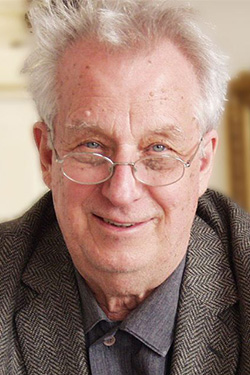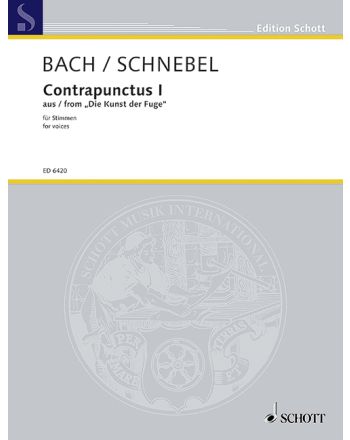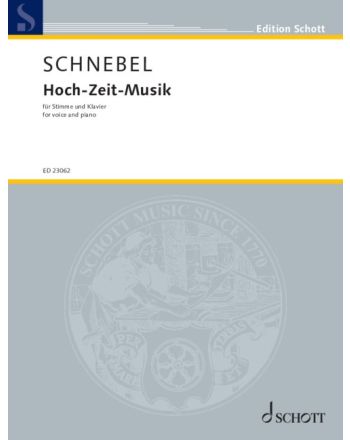
Dieter Schnebel
About Dieter Schnebel
When time becomes an instant, it is transformed into space. Every spatial construction and each spatial distance is temporal: a temporal unit in which time is consolidated. (Dieter Schnebel)
Dieter Schnebel was born in Lahr/Baden on 14 March 1930. He began his studies at the Musikhochschule in Freiburg in 1949, simultaneously attending lectures given by Martin Heidegger at the University of Freiburg, and forged close contacts with the Kranichsteiner (now Darmstadt) Summer Courses for New Music (Adorno, Varèse, Messiaen, Nono, Stockhausen and later Cage). Schnebel then studied Protestant Theology (Karl Barth, Rudolf Bultmann), Philosophy (including the works of Ernst Bloch) and Musicology (Walter Gerstenberg, doctoral thesis on dynamics in the music of Schoenberg) in Tübingen from1952 to 1956. He was subsequently employed as a teacher and pastor in Kaiserslautern, Frankfurt/Main and Munich. A position as professor for experimental music and musicology was specially created for Schnebel at the Hochschule der Künste in Berlin in 1976, a post he occupied until becoming professor emeritus in 1995. He continued his theological activities as a preacher at the Johann-Sebastian-Bach church in Berlin-Lichterfelde and the church of St.Anne in Berlin-Dahlem. He wrote numerous musicological essays and books on subjects ranging from Bach, Beethoven, Schubert, Schumann, Wagner, Mahler and Debussy to Cage and Kagel.
Schnebel was originally a strict serial composer: Stücke für Streichinstrumente (1954/55), dt 31,6 (1956-58) and Compositio (1955/56), before an increasing anti-dogmatism spurred him on to develop experimental concept and process composition methods: Glossolalie 61Das Urteil (1959/60), (based on Kafka, 1959) and Ki-No (1963/67) in which he exploits the use of the human voice in previously unknown dimensions ranging from whispering and wheezing to screaming. He also produced compositions of a sacred character (Für Stimmen (…missa est) (1956-69), Dahlemer Messe (1984/87), Magnificat (1996/97) and missa brevis (2000-02), arrangements of Bach chorales and organ works), including works for the church pavilion at the EXPO 2000 and the documenta 2001. Through the creation of the theatre group "Die Maulwerker" at the Berlin Hochschule der Künste, Schnebel was able to systematise his open work concept which was only partially based on “fluxus” (réactions 1960/61, visible music 1960/62 and anschläge-ausschläge 1965/66) in which the musicians were instructed to participate in spatial actions involving the unconventional utilisation of their instruments and voices (Harley-Davidson for 9 motorbikes and trumpet 2000, Flipper for slot machine, performers, instruments and tape recorder 2002/03).
Each of the following work cycles originated in compositional processes over a period of several years: Maulwerke, Körper-Sprache, Schulmusik, Laut-Gesten-Laute, Museumsstücke, Schau-Stücke and Bachmann-Gedichte. In the cycles Re-Visionen (1972-92) and Tradition (1975-95) and also in the chamber music series Psycho-Logia (incl. Pan 1978/88 and Medusa 1989/93) with its references to Greek mythology, the composer developed innovative concepts in the relationship between traditional and new or experimental music. The opera Majakowskis Tod - Totentanz (1989/97), the large-scale vocal work Ekstasis (1996/97/2001) and the monumental Sinfonie X (1987/92/2004) can be counted among Schnebel’s key works.
In 1991, Schnebel was awarded the Lahr Culture Prize and was the first recipient of the European Church Music Prize awarded by the town of Schwäbisch Gmünd in 1999. He is a member of the Academy of Arts in Berlin, the Free Academy of Arts in Leipzig (both since 1991) and the Bavarian Academy of Fine Arts (since 1996).
Worklist
Chronology
"Museumsstücke I ", "MoMA, Museumsstücke II " for flexibel voices and instruments, "Numbers" for solo vocalist, "Schau-Stücke" Body etudes for voice and gestures, "Worte-Töne-Schritte" Musical story for voice, synthesizer and percussion
Vocal music:
"Motetus I " for two choirs, "Lamento di Guerra" for voice and organ, "Amazones" for five female voices, "Kaschnitz-Gedichte" for voice and piano, "Quintessenz´" for vocal quartet with piano, "Mit diesen Händen" for voice and violoncello
Instrumental music:
"Toccata mit Fugen" for large organ and percussion, "Lamah" for string trio with voice
Heart attack, bypass surgery
"Motetus II ", "Magnificat" for schola, chor and percussion, "Missa brevis", "Psalm 139" for voice and percussion, "Aschermittwochsmusik" for schola, choir, organ and percussion, "David-Project"
"Y2K" (at 1.1.2000) for voices, "Harley-Davidson" for 9 motorcycles and trumpet, "N.N." for flexible voices and instruments, "Flipper" for pinball machines, voices, performers, instruments and tape, "Fontanta-Mix-Musik" for 2 performers, 2 instruments and tape, "Zimzum-Musik" Project for string trio, voice, synthesizer and projection
Further chamber music:
"Verschattungen" for bass clarinet, viola and tape, "Anfänge..." for guitar (saxophone, percussion ad lib.), "Bachmann-Gedichte" for voice, saxophone and percussion
Products
-
Bachmann Poems IIComposer: Dieter SchnebelEdition: ScoreSeries: Edition Schott
Instrumentation: female voice, clarinet or saxophone, violin, cello, piano and percussionProduct number: ED 20911Product TypeIn stockAs low as €46.99Incl. Tax -
for choir (and organ or synthesizer ad lib.)Composer: Dieter SchnebelEdition: Choral scoreSeries: Schott Chamber Choir
Instrumentation: choir a cappellaProduct number: SKR 20069Product TypeIn stockAs low as €10.99Incl. Tax -
"in space"Composer: Dieter SchnebelEdition: Score and partsSeries: Edition Schott
Instrumentation: string quartetProduct number: ED 20297Product TypeIn stockAs low as €47.99Incl. Tax -
Textfragmente aus "Penthesilea"Composer: Dieter SchnebelEdition: Choral scoreSeries: Schott Chamber Choir
Instrumentation: female choir (SSMezAA)Product number: SKR 20038Product TypeIn stockAs low as €10.99Incl. Tax -
(Versuche I)Composer: Dieter SchnebelMedia Type: Hire/performance materialEdition: Performance materialInstrumentation: Saiteninstruments and percussion
-
Anregungen I,2 (aus Schulmusik)Composer: Dieter SchnebelMedia Type: E-score PDFSeries: Workshop
Instrumentation: 5–12 player (wind instruments, strings or gemischtEb ensemble)Product number: WKS 45 Q42345In stock€7.99Incl. Tax -
(Modelle No. 5) Szenische Variationen für 3 InstrumentalistenComposer: Dieter SchnebelMedia Type: Sheet musicEdition: Performing scoreInstrumentation: flute, cello and harpsichordProduct number: ED 6641In stock€43.00Incl. Tax, Excl. Shipping
-
Composer: Dieter SchnebelEdition: Vocal and performing scoreSeries: Edition Schott
Instrumentation: Schola, mixed choir, organ and percussionProduct number: ED 9817Product TypeIn stockAs low as €18.99Incl. Tax -
Sechs kleine KlavierstückeIn stock€23.00Incl. Tax, Excl. Shipping
-
Contrapunctus XI from "The Art of Fugue"Composer: Johann Sebastian BachArranger: Dieter SchnebelEdition: Choral scoreSeries: Edition Schott
Bach-Contrapuncti
Instrumentation: 20 Vocalists (5S/5A/5T/5B)Product number: ED 6681Product TypeIn stockAs low as €18.99Incl. Tax -
Contrapunctus VI from "The Art of Fugue"Composer: Johann Sebastian BachArranger: Dieter SchnebelEdition: Choral scoreSeries: Edition Schott
Bach-Contrapuncti
Instrumentation: 20 Vocalists (5S/5A/5T/5B)Product number: ED 6680Product TypeIn stockAs low as €23.99Incl. Tax -
Contrapunctus I from "The Art of Fugue"Composer: Johann Sebastian BachArranger: Dieter SchnebelEdition: Choral scoreSeries: Edition Schott
Bach-Contrapuncti
Instrumentation: 20 Vocalists (5S/5A/5T/5B)Product number: ED 6420Product TypeIn stockAs low as €17.99Incl. Tax -
Product TypeIn stockAs low as €16.99Incl. Tax
-
(Johann Peter Hebel)Composer: Dieter SchnebelMedia Type: Hire/performance materialEdition: Performance materialInstrumentation: speaker and chamber ensembleLanguage: German
-
(Re-Visionen I,2)Composer: Dieter SchnebelMedia Type: Hire/performance materialEdition: Performance materialInstrumentation: Chamber Ensemble
-
(zu Re-Visionen I,5: Schubert-Phantasie)Composer: Dieter SchnebelMedia Type: Hire/performance materialEdition: Performance materialInstrumentation: string orchestra
-
for horn and celloComposer: Dieter SchnebelEdition: Performing scoreSeries: Il Corno
Edition Schott
Instrumentation: horn and celloProduct number: COR 21Product TypeIn stockAs low as €13.99Incl. Tax -
für OrchesterComposer: Dieter SchnebelMedia Type: Hire/performance materialEdition: Performance materialInstrumentation: orchestra
-
Composer: Dieter SchnebelMedia Type: Sheet musicEdition: Study scoreSeries: Music Of Our Time
Canones
Instrumentation: orchestraProduct number: ED 8835In stock€41.00Incl. Tax, Excl. Shipping -
Composer: Dieter SchnebelInterpreter: Juan Allende-Blin | Guiseppe G. Englert | Carla Henius | William Pearson | Gisela Saur-Kontarsky | Gerd ZacherOrchestra/ensemble: Interpretenensemble DarmstadtConductor: Dieter SchnebelMedia Type: CDProduct number: WER 62872In stock€18.50Incl. Tax, Excl. Shipping
-
(Versuche IV)Composer: Dieter SchnebelMedia Type: Hire/performance materialEdition: Performance materialInstrumentation: orchestra
-
(Modelle No. 3)Composer: Dieter SchnebelMedia Type: Sheet musicEdition: Performing scoreInstrumentation: 1Pianist (and Audience)Product number: ED 5703Out of stock€32.00Incl. Tax, Excl. Shipping
-
A collection of new pieces for pianoMedia Type: Sheet musicInstrumentation: pianoLanguage: EnglishProduct number: ED 21470In stock€10.00Incl. Tax, Excl. Shipping
-
nach Franz KafkaComposer: Dieter SchnebelMedia Type: E-score PDFSeries: Workshop
Instrumentation: denatured instruments, natured singing voices, other acoustic sources and audienceLanguage: GermanProduct number: WKS 28 Q42337In stock€19.99Incl. Tax -
nach Franz KafkaComposer: Dieter SchnebelMedia Type: Hire/performance materialEdition: Performance materialInstrumentation: Instrumente, Stimmen und sonstige SchallquellenLanguage: German
-
List of Published WorksIn stock€0.00Incl. Tax, Excl. Shipping
-
Lesegänge durch Leben und WerkComposer: Dieter SchnebelAuthor: Gisela NauckMedia Type: BookLanguage: GermanProduct number: ED 8479In stock€56.00Incl. Tax, Excl. Shipping
-
Film von Peider A. Defilla / Reihe "musica viva – forum der gegenwartsmusik"Media Type: DVDProduct number: NZ 51Out of stock€29.50Incl. Tax, Excl. Shipping
-
(Räume 4)Composer: Dieter SchnebelMedia Type: E-score PDFSeries: Workshop
Instrumentation: 3 different ensemblesProduct number: WKS 32 Q42340In stock€4.99Incl. Tax -
für Sopran-Solo, Sprecher, 2 Kinderstimmen, Schlagzeug-Solo, Chor und großes OrchesterComposer: Dieter SchnebelMedia Type: Hire/performance materialEdition: Performance materialInstrumentation: soprano-solo, speaker, 2 children's voices, percussion-solo, choir and large orchestraLanguage: German
-
Product TypeIn stockAs low as €18.99Incl. Tax
-
Kammermusik für Spielautomaten, Darsteller, Instrumente und TonbandComposer: Dieter SchnebelMedia Type: Hire/performance materialEdition: Performance materialInstrumentation: gaming machines, performers, instruments and tape
-
Composer: Dieter SchnebelMedia Type: Sheet musicEdition: Performing scoreInstrumentation: violin and pianoProduct number: ED 7988In stock€21.00Incl. Tax, Excl. Shipping
-
(Versuche III)Composer: Dieter SchnebelMedia Type: Hire/performance materialEdition: Performance materialInstrumentation: chamber ensemble and voice (ad libitum)Language: German
-
1. dt 31,6 (Fassung für großen Chor)Composer: Dieter SchnebelEdition: ScoreInstrumentation: 12 Choir Groups (SSAA/AABB/STB/AATB/SSTT/STTB/SSBB/AAB/AATT/ATTB/SAB/TTBB)Product number: ED 6640Product TypeIn stockAs low as €19.99Incl. Tax
-
Teil II: amnComposer: Dieter SchnebelEdition: ScoreSeries: Für Stimmen (... missa est)
Instrumentation: 7 Vocal groups (SAB/AT/ST/TB/AB/AS/STB, Speaking choir)Product number: ED 6456Product TypeIn stockAs low as €24.99Incl. Tax -
Teil I: dt 31,6 (Urfassung)Composer: Dieter SchnebelMedia Type: Sheet musicEdition: ScoreSeries: Für Stimmen (... missa est)
Instrumentation: mixed choir (SSSAAATTTBBB)Product number: ED 6458In stock€25.50Incl. Tax, Excl. Shipping -
Choralvorspiele I/IIComposer: Dieter SchnebelMedia Type: Sheet musicEdition: ScoreSeries: Für Stimmen (... missa est)
Instrumentation: organ, second instruments and tapeProduct number: ED 6532In stock€24.00Incl. Tax, Excl. Shipping -
Composer: Dieter SchnebelInterpreter: AG Neue Musik am Leininger-Gymnasium GruenstadtConductor: Manfred PetersMedia Type: MP3 downloadProduct number: WER 73522 Q51617In stock€4.99Incl. Tax
-
(Projekte III)Composer: Dieter SchnebelMedia Type: E-score PDFEdition: Vocal and performing scoreSeries: Workshop
Instrumentation: 2-4 Speakers and 2-4 InstrumentalistsProduct number: WKS 26 Q45062In stock€17.99Incl. Tax -
(Projekte IV)Composer: Dieter SchnebelEdition: Performing scoreInstrumentation: 3 (4) Speakers and 3 (4) Instrumentalists - conductorProduct number: ED 6414Product TypeIn stockAs low as €32.99Incl. Tax
-
Ensemble IComposer: Dieter SchnebelMedia Type: E-score PDFSeries: Workshop
Instrumentation: archaic and exotic instruments (1 wind instruments, 1 strings, 1 percussion)Product number: WKS 30 Q42338In stock€9.99Incl. Tax -
für Trompete (Posaune), Synthesizer und 9 MotorräderComposer: Dieter SchnebelMedia Type: E-score PDFSeries: Workshop
Instrumentation: trumpet (trombone), synthesizers and 9 MotorräderProduct number: WKS 46 Q40267In stock€9.99Incl. Tax -
for violin, violoncello and pianoComposer: Dieter SchnebelEdition: Score and partsSeries: Edition Schott
Instrumentation: piano trioProduct number: ED 20629Product TypeIn stockAs low as €21.99Incl. Tax -
for voice and pianoComposer: Dieter SchnebelEdition: Separate editionSeries: Edition Schott
Instrumentation: voice and pianoProduct number: ED 23062Product TypeIn stockAs low as €10.99Incl. Tax -
Konzert für Klavier und OrchesterComposer: Dieter SchnebelMedia Type: Hire/performance materialEdition: Performance materialInstrumentation: piano and orchestra
-
(Tradition I1) Kanon à 7Composer: Dieter SchnebelMedia Type: E-score PDFEdition: Performing scoreInstrumentation: 7 equal Instruments (vocal Version: 7 Sopranos and 7 Basses)Product number: ED 6659 Q24018In stock€13.99Incl. Tax
-
Six Pieces for Piano Trio with VoiceComposer: Dieter SchnebelEdition: Score and partsSeries: Edition Schott
Instrumentation: violin, cello, piano and voiceProduct number: ED 21262Product TypeIn stockAs low as €46.99Incl. Tax -
für kleines OrchesterComposer: Dieter SchnebelMedia Type: Hire/performance materialEdition: Performance materialInstrumentation: small orchestra
-
(Tradition V1)Composer: Dieter SchnebelMedia Type: Sheet musicInstrumentation: 1 Organist and eventuell 1 AssistentProduct number: ED 8193In stock€32.00Incl. Tax, Excl. Shipping




































